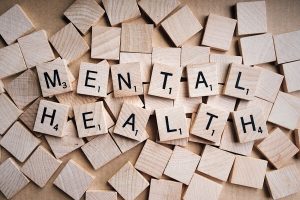2
Laurence Innes and Meg Botts
Introduction

Have you ever experienced situational stress and anxiety? Thanks to the COVID-19 pandemic, many college students and teens have had to experience increased levels of stress and anxiety over the past year. The social isolation and fear of contracting the disease has affected the mental health of teens and college age students by forcing them to acknoledge their own mortality. The pandemic has destroyed their normal social life at school and caused new stress and anxiety about uncertainty of life, isolation, and family issues, on top of the existing stress of college courses.
Connection to STS Theory
This topic relates to STS because in this global pandemic, scientists are researching and finding new ways to deal with COVID-19, and our society has created incredible new technology to help combat the pandemic. Hopefully through scientific research and new technology, there will be many ways to help teens and college students deal with their new mental health conditions due to COVID-19. The path dependence theory is when decisions presented to people are dependent on their prior decisions or experiences. This theory relates to the topic because many people do not know the true facts about COVID-19, everyone believes what they are told. People base their decisions off of what others have told them because so little is known about the impacts of COVID-19 on teens and college students’ mental health.
Mental Health Developments Due to COVID-19
Early studies in China have shown an increase in disorders such as depression and anxiety associated with COVID-19 (Chen, 2020). Young adults have suddenly been stripped of what is known as normal. Many things are different such as social interactions, school activities, and physical activity. Teens will often view this as the “new normal”. As a teenager, life can be very busy and stressful as it is, and a global pandemic only makes things worse. The age of teens and young adults is such a critical time for development of their mental health. Similarly, college students now have to navigate the stress of their coursework on top of the stress of the global pandemic. College students are more likely to experience negative health effects due to COVID-19 than any other age group (Peterson, 2020). College students have begun to cope with COVID-19 by binge drinking, and researchers have found a direct correlation between stress due to COVID-19 and excessive drinking (Lechner, 2020). Because college students and teens cannot participate in normal social experiences, they are more likely to develop stress and or anxiety and during this unprecedented time a special consideration is needed for adolescents (Darren, 2020) .
Voices from Clemson Undergraduate Students
“It was hard to navigate a new environment while being isolated from normal social activities and staying on top of my coursework” -Laurence Innes
“When I had COVID-19, it was very difficult to balance my physical health, school work, and social life due to isolation.” -Meg Botts
“It has lead me to feel more isolated and anxious about seeing people. College is supposed to be a social time so I feel anxious about missing out on a part of life.” -Clemson University Senior
Students Experience Stress in Different Ways

The stress of the COVID-19 pandemic affected students differently. Many studies have been conducted that have shown the increase in mental health problems such as depression due to social isolation. The duration of loneliness is shown to be worse than the intensity of loneliness. When one has a longer time to dwell on a problem it often makes the issue a lot worse. Other studies have found that students with prior mental health conditions either improved or stayed the same throughout the quarantine period, but other students with no prior mental health conditions tended to decline due to this social isolation (Hamza et al., 2020).
Long Term Mental Health Effects
Some of the long term effects of COVID-19 can lead to an increase in reckless behaviors including suicidal thoughts and actions. Researchers found that a majority of students at Texas A&M showed increased levels of anxiety and depression and 18% of students had suicidal thoughts (Wang et al., 2020). These students who missed their friends and college settings had a hard time adapting to the distanced life at home. Teens experienced similar thoughts and feelings throughout the spring while they were isolated at home for online classes. Young adults also showed increased levels of anxiety due to worrying about the safety of their loved ones (“Mental Health”, 2020). Young adults with family issues such as a loss of a loved one due to COVID-19 are at a greater risk of mental health problems (“Mental Health During COVID-19: Signs Your Child”, 2020). The gravity of COVID-19 is not often realized until it affects someone in your own family. Adolescents that have experienced a loss sometimes need professional counseling to deal with the loss and grief (“Mental Health During COVID-19: Signs Your Child”, 2020). Overall, college students and teens varied in their reaction to the COVID-19 pandemic, but many students had increased levels of anxiety due to worry for others or lack of social activity.
Mental Health on Freshman and International Students
COVID-19 has impacted mental health in students all around especially in college. Freshman and international students are first time college students or new students to a certain college. Throughout the pandemics many “new” students got a very different experience compared to normal college life. Many classes were online, mask ordinance, strict social distancing, and all around new rules. As college students you are used to having roommates, neighbors, and friends all around you. For freshman students being stuck in a small dorm room with a roommate, having to wear your mask to the bathroom, having to sit in your room all day for classes, and having a harder time than most past freshman meeting friends, can cause mental health issues. Stressors, anxiety, fear, and so much more are causes that lead to mental health that can cause and have caused sucidal cases. As for international students, many could not attend the college they were supposed to travel and go to, many had no friends in a new country at college for being on lockdown, and many had to be careful traveling in order not to catch the virus. International students who were able to attain their college had a similar experience as freshman students trying to figure out college at a whole new place that you are not familiar with. A survey was done at a large university in Texas with college students and their mental health throughout the pandemic. In the survey conducted, “Out of 195 participants, 138 (71%) indicated that their stress and anxiety had increased due to the COVID-19 pandemic, whereas 39 (20%) indicated it remained the same and 18 (9%) mentioned that the stress and anxiety had actually decreased. Among those who perceived increased stress and anxiety, only 10 (5%) used mental health counseling services. A vast majority of the participants (n=189, 97%) presumed that other students were experiencing similar stress and anxiety because of COVID-19”(Son,2020). Overall, the pandemic has caused more than just sickness for college students but also stress.
Mental Health of Seniors
College is supposed to be the most social time of one’s life. With the COVID-19 pandemic, socialization has been strongly discouraged. The last years of college before graduating are supposed to be about meeting new people while spending time with college friends while preparing for full time jobs or further graduate studies. Along with the overall decrease in socialization and time on campus, the COVID-19 pandemic stripped away special and unique memories from the final months of college. Special traditions that students look forward to were cancelled in order to slow the spread. In May 2020, graduation ceremonies were cancelled or postponed. Some were even done over Zoom. The seniors that responded to the survey all said that COVID-19 has increased anxiety, loneliness and depressed feelings. “I never knew what day it was. I didn’t have any in person classes which did not make my last year seem real. There was also nothing to do on the weekends so the entire semester blended together.” Graduating seniors also face difficulties when finding jobs. In April 2020, unemployment peaked at 14.6%. Before the COVID-19 pandemic, the unemployment rate was at an all-time low at 4.4% (Kochhar, 2020). “I am currently having a really hard time finding a job that I want to work at. All of the jobs that interest me are currently remote. I want to be able to meet co-workers and get a feel for the company but working remote makes it almost impossible to have a normal first job out of college experience.” The difficulty in finding a job can add anxiety and stress to not just seniors but other college students looking for internships.
Clemson’s Response: Survey of COVID-19’s effect on Clemson University Students
During the Spring 2021 semester, students from Clemson University participated in a survey that asked three questions about how they were mentally impacted by COVID-19. The survey received twenty three responses, with about forty-four percent of respondents in the freshman year, followed by thirty-five percent sophomores and a small percentage of both juniors and seniors. The questions in the survey asked whether or not the student’s mental health was impacted by COVID-19, whether or not they experienced increased stress or anxiety due to COVID-19 while being a college student, and if COVID-19 has lead to an increase in their alcohol intake. Results of the survey are graphed below.
Conclusion

The COVID-19 pandemic has caused many students to deal with emotions they may have never experienced before. Students are dealing with the stress of fearing for their safety as well as the usual stress of college. The increased levels of stress associated with the pandemic has led many students to experience changes in mood, loss of interest in activities, changes in weight, inability to sleep, and problems with memory and concentration (“Mental Health During COVID-19: Signs Your Child”, 2020). As stated in past chapters, there is a potential for a global spike in depression and suicide as mental health continues to worsen. In addition to these issues, COVID-19 can potentially intensify disorders such as OCD (obsessive-compulsive disorder), specific phobias, and general anxiety resulting from the unpredictable situations resulting from the pandemic (Malapani, 2020; Darren, 2020). Researchers have seen that the effects of social isolation and complete shutdown has caused an increase in people having suicidal thoughts or developing depression. These symptoms can be extremely detrimental to one’s health and as such, it is important to be aware of the signs of anxiety and depression in order to tell when a friend needs help or even to self diagnose. There are many resources out there to help self diagnose or to help recognize the warning signs in friends and loved ones, including a self guided diagnosis published on Yale Medicine’s website (Katella, 2020).
It is important to notice the warning signs and recognize that during this confusing time, mental health conditions are common and that it is ok to ask for help. COVID-19 has changed the lives of every college student and teen, taking them out of the environment they had become accustomed to and isolating them. It has affected every young adult differently and its effects will be felt long after the pandemic has ended. There are many new mental health conditions that have arisen in this age group due to the stress of the global pandemic. It is important to bring light to this stress and mental health of the teens and college students and realize when you or your friends are experiencing these things so that you can seek help. In all, COVID-19 has impacted every college students’ experience causing stress and anxiety leading to mental health conditions.
Additional Resources
As we begin to move forward past the pandemic, it is still important to maintain an awareness of how COVID-19 has impacted and will impact the lives of everyone, especially college students. As discussed previously, there are warning signs to look out for regarding poor mental health and these are especially important to watch for during this time. Listed below are resources that can be used during this difficult time in the lives on many college students, but are also available for anyone to use, no matter their age.
SAMHSA’s National Helpline – 1-800-662-HELP (4357)
SAMHSA’s (Substance Abuse and Mental Health
Services Administration) National Helpline is a free, confidential, 24/7, 365-day-a-year treatment referral and information service (in English and Spanish) for individuals and families facing mental and/or substance use disorders.
LGBT National Help Center (Linked Here)
The LGBT National Help Center provides an online peer-support chat as well as free, confidential counseling over the phone for the LGBT community.
ULifeline (Linked Here)
A project of the Jed Foundation that provides a free, confidential online resource about emotional health to more than 1,500 colleges and universities.
References
Chen, Bo, et al. “How Have COVID-19 Isolation Policies Affected Young People’s Mental Health? – Evidence From Chinese College Students.” Frontiers, Frontiers, 9 June 2020, www.frontiersin.org/articles/10.3389/fpsyg.2020.01529/full.
Darren Courtney, Priya Watson. “COVID-19 Impacts on Child and Youth Anxiety and Depression: Challenges and Opportunities – Darren Courtney, Priya Watson, Marco Battaglia, Benoit H. Mulsant, Peter Szatmari, 2020.” SAGE Journals, journals.sagepub.com/doi/10.1177/0706743720935646.
Hamza, C. A., Ewing, L., Heath, N. L., & Goldstein, A. L. (2020). When social isolation is nothing new: A longitudinal study psychological distress during COVID-19 among university students with and without preexisting mental health concerns. Canadian Psychology/Psychologie Canadienne. https://doi-org.libproxy.clemson.edu/10.1037/cap0000255.supp (Supplemental)
Katella, K. (2020, August 5). Taking Your ‘Mental Health’ Temperature During COVID-19. Yale Medicine. https://www.yalemedicine.org/stories/mental-health-covid-19/
Kochhar, R. (2020, August 26). Unemployment rose higher in three months of COVID-19 than it did in two years of the Great Recession. Retrieved April 24, 2021, from https://www.pewresearch.org/fact-tank/2020/06/11/unemployment-rose-higher-in-three-months-of-covid-19-than-it-did-in-two-years-of-the-great-recession/
Lechner, W. V., Laurene, K. R., Patel, S., Anderson, M., Grega, C., & Kenne, D. R. (2020). Changes in alcohol use as a function of psychological distress and social support following COVID-19 related University closings. Addictive Behaviors, 110. https://doi-org.libproxy.clemson.edu/10.1016/j.addbeh.2020.106527
Malapani, C. (2020, May 25). COVID-19 and the Need for Action on Mental Health. Columbia University Department of Psychiatry. https://www.columbiapsychiatry.org/news/covid-19-and-need-action-mental-health
Mental Health and Coping During COVID-19. (2020, July 1). CDC. Retrieved October 9, 2020, from https://www.cdc.gov/coronavirus/2019-ncov/daily-life-coping/managing-stress-anxiety.html.
“Mental Health During COVID-19: Signs Your Child May Need More Support.” (2020, October 23). HealthyChildren.org, www.healthychildren.org/English/health-issues/conditions/COVID-19/Pages/Signs-your-Teen-May-Need-More-Support.aspx.
Peterson, J. (2020, September 3). Can Colleges Hold Space for Student’s Mental Health during a Global Pandemic? Washington Informer, 55(46), 27–46.
Son, C., Hegde, S., Smith, A., Wang, X., & Sasangohar, F. (2020, September 3). Effects of COVID-19 on College Students’ Mental Health in the United States: Interview Survey Study. Journal of medical Internet research. https://www.ncbi.nlm.nih.gov/pmc/articles/PMC7473764/.
Wang, X., Hegde, S., Son, C., Keller, B., Smith, A., & Sasangohar, F. (2020). Investigating Mental Health of US College Students During the COVID-19 Pandemic: Cross-Sectional Survey Study. Journal of medical Internet research, 22(9), e22817. https://doi.org/10.2196/22817
Images
Image 1- “Mental Health Wellness Psychology Mind.” by Wokandapix at Pixabay is licensed under CC BY-NC 4.0
Image 2- “Mental illness can lead to 20 year loss in life expectancy: Research” by Dr Evelyn Lewin is licensed under CC BY-NC 4.0
Image 3- “If COVID-19 is an earthquake, the mental health aftershocks have only just begun | Expert Opinion” by Volkan Sezai Suda / Getty Images is licensed under CC BY-NC 4.0

